- Clone
- A17136C (See other available formats)
- Regulatory Status
- RUO
- Other Names
- B4, CVID3
- Isotype
- Mouse IgG2b, κ
- Ave. Rating
- Submit a Review
- Product Citations
- publications
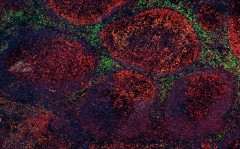
-
Human paraffin-embedded tonsil tissue slices were prepared with a standard protocol of deparaffinization and rehydration. Antigen retrieval was done with Sodium Citrate H.I.E.R. 1X at 95°C for 40 minutes. Tissue was washed with PBS/0.05% Tween 20 twice for five minutes and blocked with 5% FBS and 0.2% gelatin for 30 minutes. Then, the tissue was stained with 10 µg/mL of anti-human CD19 (clone A17136C) Alexa Fluor® 594 (red) and anti-human CD8a (clone C8/144B) Alexa Fluor® 647 (green) at 4°C overnight. Nuclei were counterstained with DAPI (blue). The image was captured with a 10X objective.
| Cat # | Size | Price | Quantity Check Availability | Save | ||
|---|---|---|---|---|---|---|
| 396305 | 25 µg | 123€ | ||||
| 396306 | 100 µg | 310€ | ||||
CD19 is a 95 kD type I transmembrane glycoprotein also known as B4. It is a member of the immunoglobulin superfamily expressed on B-cells (from pro-B to blastoid B cells, absent on plasma cells) and follicular dendritic cells. CD19 is involved in B cell development, activation, and differentiation. CD19 forms a complex with CD21 (CR2) and CD81 (TAPA-1), and functions as a BCR co-receptor.
Product DetailsProduct Details
- Verified Reactivity
- Human
- Antibody Type
- Monoclonal
- Host Species
- Mouse
- Immunogen
- Recombinant human CD19
- Formulation
- Phosphate-buffered solution, pH 7.2, containing 0.09% sodium azide.
- Preparation
- The antibody was purified by affinity chromatography and conjugated with Alexa Fluor® 594 under optimal conditions.
- Concentration
- 0.5 mg/ml
- Storage & Handling
- The antibody solution should be stored undiluted between 2°C and 8°C, and protected from prolonged exposure to light. Do not freeze.
- Application
-
IHC-P - Quality tested
- Recommended Usage
-
Each lot of this antibody is quality control tested by formalin-fixed paraffin-embedded immunohistochemical staining. For immunohistochemistry, a concentration range of 5.0 - 10 µg/ml is suggested. It is recommended that the reagent be titrated for optimal performance for each application.
* Alexa Fluor® 594 has an excitation maximum of 590 nm, and a maximum emission of 617 nm.
Alexa Fluor® and Pacific Blue™ are trademarks of Life Technologies Corporation.
View full statement regarding label licenses - RRID
-
AB_2892463 (BioLegend Cat. No. 396305)
AB_2892463 (BioLegend Cat. No. 396306)
Antigen Details
- Structure
- Ig superfamily, type I transmembrane glycoprotein, 95 kD
- Distribution
-
Normal and malignant B lymphocytes
- Function
- B cell activation and differentiation
- Interaction
- Forms a complex with CD21, CD81 and CD225 in the membrane of mature B cells and interacts with VAV and LYN. It also interacts with GRAB2 and SOS when phosphorylated on Tyr-348 and/or Tyr-378 and with PLCG2 when phosphorylated on Tyr-409.
- Ligand/Receptor
- Forms complex with CD21 (CR2) and CD81 (TAPA-1), BCR coreceptor
- Cell Type
- B cells, Lymphocytes
- Biology Area
- Costimulatory Molecules, Immunology
- Molecular Family
- CD Molecules
- Antigen References
-
- Tedder T, et al. 1994. Immunol Today. 15:437.
- Bradbury L, et al. 1993. J Immunol. 151:2915.
- Gene ID
- 930 View all products for this Gene ID
- UniProt
- View information about CD19 on UniProt.org
Related FAQs
Other Formats
View All CD19 Reagents Request Custom Conjugation| Description | Clone | Applications |
|---|---|---|
| Alexa Fluor® 647 anti-human CD19 | A17136C | IHC-P |
| Alexa Fluor® 594 anti-human CD19 | A17136C | IHC-P |
| Purified anti-human CD19 | A17136C | IHC-P |
Customers Also Purchased
Compare Data Across All Formats
This data display is provided for general comparisons between formats.
Your actual data may vary due to variations in samples, target cells, instruments and their settings, staining conditions, and other factors.
If you need assistance with selecting the best format contact our expert technical support team.
-
Alexa Fluor® 647 anti-human CD19
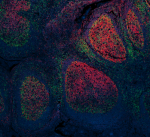
Human paraffin-embedded tonsil tissue slices were prepared w... -
Alexa Fluor® 594 anti-human CD19
Human paraffin-embedded tonsil tissue slices were prepared w... -
Purified anti-human CD19
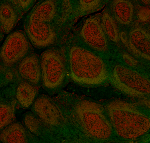
Human paraffin-embedded tonsil tissue slices were prepared w...
 Login / Register
Login / Register 












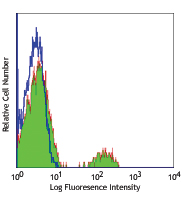
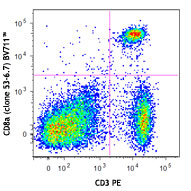
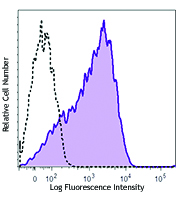
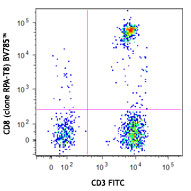




Follow Us